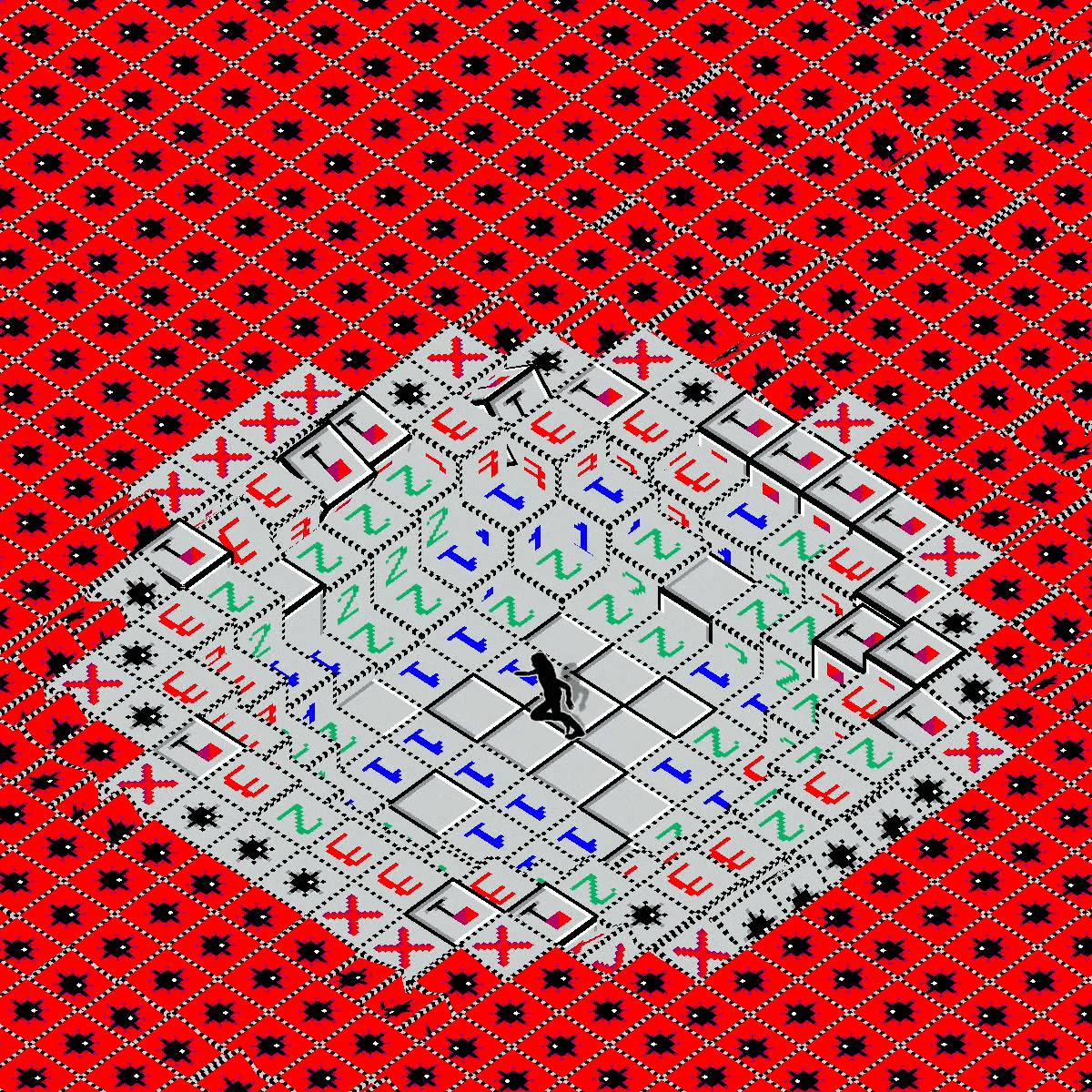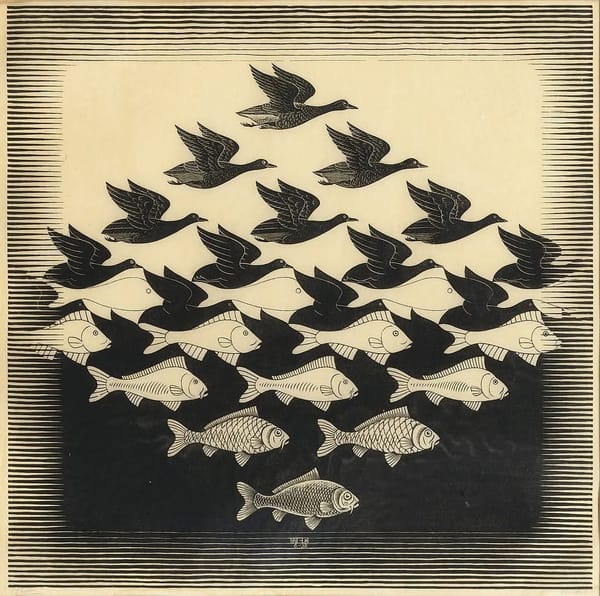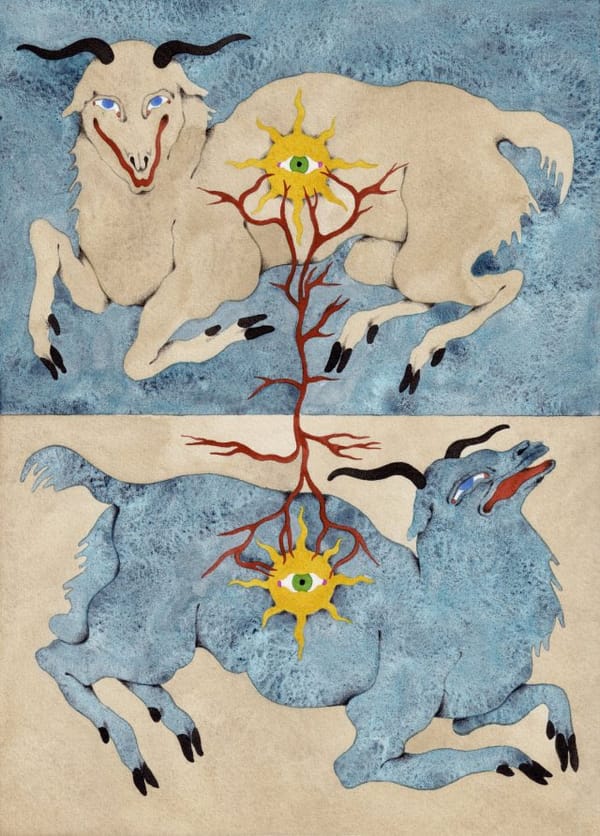Hypermorality
On monoculture, motivation, and lines between logistics and morals

Each numbered section of this post is followed by a one-sentence summary. The existence of LLMs spurred their inclusion but they were written by me.
hyperreality
an image or simulation, or an aggregate of images and simulations, that either distorts the reality it purports to depict or does not in fact depict anything with a real existence at all, but which nonetheless comes to constitute reality
demoralize
1. to deprive (a person or persons) of spirit, courage, discipline, etc.; destroy the morale of
2. to throw (a person) into disorder or confusion; bewilder
3. to corrupt or undermine the morals of
I
A pattern you'll find on TikTok: a creator who used to post diverse stuff has stopped doing so. One day they posted something that did numbers and almost immediately their content narrowed like a laser, replicating what worked. Sometimes you'll catch them just after this has happened; other times you'll find row after row of nearly indistinguishable videos, going back months, like a field of soybeans stretching to the horizon. Do most of them do this with irony and detachment? Sure. Chase that bag. Do most of the videos take mere seconds to make? Absolutely. There they remain: unusually potent reminders of the effects of monoculture. The machine of capital. The way it wants you; well, specific things from you. The way it convinces you that you want them from yourself, lulling you into thinking it's not a moral issue or anything, not that deep, just business. The very website on which I post this has started greeting me with a banner that reads: Turn your audience into a business.
tl;dr - We see from flattened digital presences how we silently cede parts of ourselves to the amoral, technical whims of capital instead of our inner voices, a literal instance of "demoralization."
II
"Conquer nature." No one really comes out and says it like that, but that's the game, passed down to me generation after pasty white generation. Conquer the wild by covering it with roads and air conditioning; conquer others by becoming their boss; conquer your own nature by adhering to rules. The game seemed won enough, the opponent demoralized enough, by the time I was born. We would bruise nature (ozone layer starts to disappear), bandage it (CFCs are banned), and bruise it more. We'd get bored and build new hyperrealities, Disneyland and data centers, all over its surface. I turned ten and nature cracked its knuckles. I turned twenty and it tilted its neck, left then right. I turned thirty and it was already running up the score on us in turn, with no signs of stopping. We now act to various degrees as if the scoreboard isn't there. We begin to treat our hyperrealities as refuges more than amusements. We bury ourselves in work. We see the truth – even the most vehement deniers see it – and so, even as we continue playing the game, our hearts aren't in it. I see older folks catching on to us younger folks, sniffing us out, noticing the ways in which we appear to be "giving up." That's too moral of a framing, though. It’s become dry, technical, logistical. Our roads are flooded. Our AC units are struggling. The game has shifted under our feet. We are stumbling through the process of figuring out what new game is afoot, too often behaving as though it's something that will be handed to us, rather than something we create.
tl;dr - The game of "conquering nature" is a wider example of a task that we've demoralized ourselves with, forcing ourselves into the uncharted territory of finding new cultural objectives.
III
God. We know. We see it. We get it. Enough already. Enough words, enough talk, enough content and posting, enough hand-wringing and bleating of something ought to be done. It starts to make one nauseous. How about some doing? Too many people won't be convinced by all the talk. The need to do stares us in the face, daily, hourly, constantly, as people cling to their blinders and delusions, unpoppable bubbles, impenetrable armor. Snoop Dogg in 2017: It's all on camera and they still don't believe you. We want all the voices to fall silent until the only thing left is action. We want to give our future selves a reason to say we didn't just stand around the whole time, paralyzed, watching. We want visible change, tangible results. Next step, then: what accomplishes that? There are considerations here, as oppression outstrips the individual's ability to see it all, and you can win many battles and still lose the war. What's effective? Build solidarity among the oppressed? Get through to the insulated people, the powerful and ignorant, infiltrate their circles, amass capital, reach the control panels of oppression? Or both? Or neither, simply throwing ourselves into the gears of the machine? Or neither in another way, and start from a community in isolation, accepting that fighting every logging operation and data center and government overreach is futile, agreeing on a set of rules that avoids, in one fell swoop, the many wrongs we see? These questions – this need to do – was already a theme in my AP government class, coming up on two decades ago. How has so little of this stuff, any of this, happened by now? What the hell is our species supposed to be good at if not impressive feats done in groups? Wouldn't some amount of these things have been done, long ago, many times over, if that were true? Could there be something else at play?
tl;dr - We feel compelled by the lack of coherent cultural narratives, the issues that ensue, and the difficulty of convincing each other about their urgency, toward action; but that same lack of a coherent framework for action begins to reveal the problem with "doing" as a unipolar goal.
IV
If you do your own work too well, you may get "rewarded" with other people's work. The same dynamic can happen to a person, as a tweet recently pointed out, when they're the only one in a group who can regulate their emotions. There are some great articles out there, and whole books I'm sure, on how the work of motherhood, despite making all GDP possible, is not included in calculating it. When there's activism at colleges, authorities go for the grad students, a load-bearing group: they're an easier target (more of their life's work is at stake, usually more visas to be revoked from them) and yet they do the bulk of real research and teaching. The types of free speech that deserve the most protection, like speaking up for starved and bombed civilians, are stifled, while the types that come closest to yelling "fire" in a crowded theater, whipping up violence toward the nonviolent, are amplified. Immigration authorities just detained a group of firefighters on active duty in the state of Washington, many of them indigenous. James Baldwin was right: "Love has never been a popular movement. And no one's ever wanted, really, to be free. The world is held together, really it is held together, by the love and the passion of a very few people."
tl;dr - The things that truly merit doing, and that hold the world together, are the antithesis of embracing the monoculture (mentioned in the first section); thankless, and often punished, even if people with intrinsic motivation still do them.
V
Our water and food, our electricity and screens: each comes to us enmeshed in big systems. Companies, governments, algorithms, gangs, supply chains. These are troughs we build for ourselves. They sort of sustain us, just enough to extract from us. If there's one thing, one great big all-encompassing thing, that we need to do, it's switch troughs. Make ones that don't just extract our labor and taxes and transform them into burnt forests and drone-defended bunkers for the wealthy, but sustain us and let us flourish. This requires building and building is doing; but there's more. To build them without first lifting our heads, our piggy heads, out of the troughs they're in? Freeing up our eyes and hands, at least a little? That's fundamentally impossible. We could build until our hands bleed but some things won't get done that way. Choosing to take the hard, thankless road instead of the easy one; not giving into monoculture; however much those tasks require doing, they require an even larger dose of not-doing-something-else. And that happens on the inside. A guy goes into a coffee shop and says, "I’d like a coffee without milk." The barista replies, "We’re out of milk. How about a coffee without sugar?" When you choose to not do something people will say you're lazy, you're boring, you're still monocultural and don't even have the cash to show for it. Only you can say if they're right; only you can say whether your not-doing is part of a different string of causality than they think. We are a social species, so that's particularly hard. Deciding for ourselves on reasons to do things, and especially not to do things, continuing to stand on them despite no one rewarding us, is hard. Demoralizing, sometimes. The difficult isn't just in the difficulty, but the fact that it ceases to seem moral; we forget to count it is as "something we ought to do."
tl;dr - There are concrete ways in which truly worthwhile acts require the discipline to "not do," and internally generating and sticking by one's reasons for "not doing."
VI
Sticking to rules; standing on reasons; as Dostoyevsky said, every new rule is a chance to break it, and someone will. Someone will convince themselves they're "transcending" the rule, fighting its oppression, some such thing. To rephrase Baldwin's quotation: the world runs on the intrinsic motivation of the few who bother to sustain it, within themselves. The rule that can be named is not the true rule; when rules actually work, it's because people keep agreeing they do. In the series Andor, a character is disillusioned with the sacrifices demanded by the rebellion he's part of. He says to another character, "I need to start making my own decisions." The other character says, "I thought that’s what we were fighting for." The intrinsic motivation we sustain is what gives rise to more effective kinds of motivation: systemic, collective, cohesive. But the self is the seat, the source, of the struggle. The self is what allows you to flout the rule you set for yourself, to "transcend" it even if it's healthy for you, to lose the intrinsic motivation you had to follow it. Think you can escape the self? Wherever you go, there you are. The self is the final boss battle; not inherently so, but because you have to decide what it is. The same boiling water that softens the potato hardens the egg: which are you? The axe forgets, but the tree remembers: which are you? Here's both a moral truth and a dry fact: "I am because we are." Great, now what the hell are we? What game are we playing? Are we our own final boss battle, or just our own final boss, or a secret third thing? If you don't say, the world will say for you. And the consequences of what you decide will be on you. If you decide the self is the final boss battle, then the self will keep battling you. Isn't intrinsic motivation fun?
tl;dr - The tricky thing about intrinsic motivation and the wider societal benefits that come from it: it presents a thing that can (and will) be opposed, and so the self can be considered a "final boss battle" that you always fight – most of all by deciding what kind of thing you actually consider the self to be.
VII
This tension is inevitable but merits explaining. Like birds and air, like fish and water, your brain operates on symbols. Encounter something a few times? Bam, symbol. Tree? Mountain? Spongebob Squarepants? The number four? Your brain models it. If we hear other people talk about it, we model it; if we can sense it, and sometimes if we can't, we model it. So within our present, physical, embodied self, an abstract, symbolic, modeled self arises. We know on some level that they're inextricable, one and the same, but in the trenches, a relationship forms: complex, tangled, feedback-loopy. What we like or dislike in ourselves, see or push away in ourselves, affects how we relate to others. In turn, others' actions and words toward us let us model ourselves. From this unavoidable interplay, from the way we push ourselves away or hold ourselves too close, arises most morality. Blaise Pascal said all mankind's problems stem from our inability to sit alone in a room with our thoughts. When asked after the Constitutional Convention what we ended up with, Ben Franklin said: "A republic, if you can keep it." His buddy George Washington's farewell address was a long warning about the two-party system. Whatever their motives, those petit-bourgeois shit-stirrers, they foresaw the issue: ourselves. These days, people love to repeat Gandhi's quip of "be the change you want to see in the world," but it's not so accurate anymore. We have accrued a debt, having worked on the world so much and ourselves so little. The Biggie Smalls formulation is better: to change the world, we have to change ourselves.
tl;dr - The aforementioned facts about the self are inevitable, stemming from how the brain works, and in turn, many other things – our morality, our successes and failures, the big tasks before us – stem from the relationship we maintain (or don't) with ourselves.
VIII
Trillions of dollars have gone into technology that tries to prevent this – that makes it incredibly easy to avoid this. We call discomfort with ourselves "boredom," and then eliminate that boredom, with technology. We fall off the tightrope between rationalizing, dissecting, ruminating about the self versus losing and dissolving it in cults and addictions. We fail to meet ourselves, calmly and fairly, and that failure demoralizes us. We watch Severance and get hooked, not just because the show is good, but because (no spoilers) a part of us longs to know what Mark and his split consciousness will face. On some level we know we'll face it too, the parts of ourselves we've pushed away boomeranging back. We are tempted to treat this tightrope as something inconsequential, something to hang clothes on, another annoying concern, like the dishes, and we can put it off on our to-do list. Fine; but we have to remember that we can come back to it the same way. A logistical matter, not a moral one, where you simply surround yourself with better environments, better thoughts. The way a person stops eating something they want to cut out of their diet need not be triggered by some huge event, some sudden moral certainty, some hitting of rock bottom. It can be a random Tuesday where they just stop. A person may start running, and keep running, because they decide to put on their shoes one day and keep doing it.
tl;dr - The ability to push ourselves away with modern technology can make reckoning with the self demoralizingly difficult, but the process of demoralization can be reversed, through the simple technical interventions that restore and rebuild intrinsic motivation.





